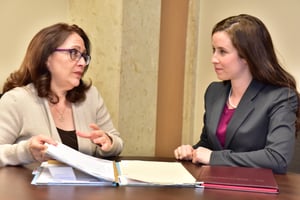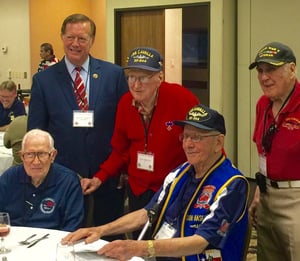Dominic Wallace ran out of options. The ex-soldier surrendered to the implacable obstacle of a massive bureaucracy. Severely injured with a head trauma just days before he could graduate from Army bootcamp, the young private was caught in the no-man’s land between the U.S. Army and the Texas National Guard, which had sent him to Army basic training. After ending up in hospitals, then processed out, Wallace found himself with no training or any of the other benefits of modern military service, and no veterans support for continuous treatment of his head injury as he wasn’t even classified as a vet. And no one would help.
“I was ready to call it quits,” he said. Seizures resulting from the head injury made any steady employment difficult, and specialized care was expensive.
However, his father saw an ad about lawyers helping veterans through the Texas Lawyers for Texas Veterans of Tarrant County (TLTV) organization. “Give them a call,” his dad recommended.
The TLTV organization, in turn, presented his case to Lynn Rodriguez, clinic supervisor and staff attorney of Texas A&M University School of Law’s Family and Veterans Advocacy Clinic. The Clinic, operating in downtown Fort Worth, is one of several TAMU-Law clinics providing opportunities for its law students to actively participate, under top professional guidance, in the kinds of duties licensed lawyers perform in the broad spectrum of the American legal system.
Rodriguez, a California native, moved to Texas and graduated from Texas Wesleyan University School of Law in Fort Worth. Her professional experience and personal passion for supporting current and past servicemen and women led her to accepting the position to be attorney for the Veterans Project of the Family & Veterans Advocacy Clinic (FVAC), providing legal support to low or no-income military vets of Tarrant County. The Veterans Project, which has been a crucial part of the FVAC since 2015, is partially funded through grants paid through the Texas Access to Justice Foundation.
The Clinic gets most of its veteran clients by either word of mouth from vet to vet, or through referrals from veterans’ assistance programs. Rodriguez herself is a member of the board of the Texas Lawyers for Texas Veterans and serves as vice president of the Veterans Coalition of Tarrant County. Other clients approach her after her classes on veterans’ issues and law she holds at the Veterans Administration Homeless Veterans Resource Center on Fort Worth’s Lancaster Street.
“We can’t accept every client at the Clinic due to grant restrictions. Our clients’ income has to be at or below the 200% federal poverty level,” Rodriguez said. Many, and perhaps most, of these veterans are homeless or sheltered awaiting a permanent residence, she added. While the Clinic provides counsel to ex-service members on a number of legal issues, there are restrictions to the type of issues they handle.
“In ranking the types of cases we work on,” Rodriguez said, “I believe number #1 would be family law, followed by VA compensation/pension/Social Security benefits – both retirement and disability – in the #2 position.” Rodriguez noted that she and her students have taken the vanguard in handling the newest changes in the VA application for benefits and appeals processes.
The Clinic, operating a close distance from the Texas A&M School of Law on Commerce Street, provides an exceptional opportunity for the School’s students to fully engage in a dynamic sector of civil law. “Our law students come to work at the Clinic to learn family law or serve veterans. Among the law students are former military members and who will become fantastic lawyers serving veterans because they understand other veterans’ needs and emotions,” she said.
A featured strength of the Texas A&M Family & Veterans Advocacy Clinic is its commitment to collaboration, Rodriguez said. “We work closely with Legal Aid of NorthWest Texas, TLTV, and VetCo (Veterans Coalition),” she said. “We are also dedicated to thinking outside the box in finding solutions to the varied legal problems of veterans.”
“What separates this program from others is that the services we provide are rather holistic, and we are free to assist veterans wherever we find them – we listen, we advise, and we go to court for them. There’s not a lot of organizations like us,” Rodriguez stated. “We take cases nobody else wants.” Further, Rodriguez suggested that some of their success has been to their approach in “brainstorming with the veteran – looking at an entire spectrum of issues facing the vet and matching them with the various veterans’ resources and benefits that may be available.”
It is no surprise veteran support organizations turn to Lynn Rodriguez to crack the hardest cases for the area’s veterans. According to Melissa Siccar, former pro bono programs director of Tarrant County Bar Association Foundation, Rodriguez is a “VA benefits guru – a Superstar of our program!” Siccar noted several significant successes of Rodriguez and her students, including securing for a terminal patient his badly needed veteran’s pension and succeeding in stopping a foreclosure on his house, so he was able to stay in his home until his death. Siccar stated that these actions and more made a “huge difference to his quality of life during his last few months.”
For her seemingly unrelenting efforts on behalf of the area’s veterans, Rodriguez recently earned the Tarrant County Bar Foundation’s Pro Bono Eagle Service Award as well as being listed in the 360 West regional magazine as one of the top attorneys for non-profit organizations. Moreover, her students also have shared in the acknowledgment, with several earning awards or recognition for their work at the Clinic.
To Rodriguez, the greatest reward is making a positive impact on the lives of veterans. For Dominic Wallace “Being recognized as a 'veteran' – the first time I saw that description of me on a VA benefits screen – was the moment I truly appreciated all that Lynn and the Texas A&M clinic have done for me,” Wallace concluded, whose VA claim Rodriguez shepherded to recognition of his veteran status and establishment of a significant monthly disability financial award, she and the Clinic have been a miracle. Wallace recalls that Rodriguez told him: “I am not going to let your case go because it is important to me.” This was eye-opening to Wallace, who said, “I have never had someone work so hard for me.”